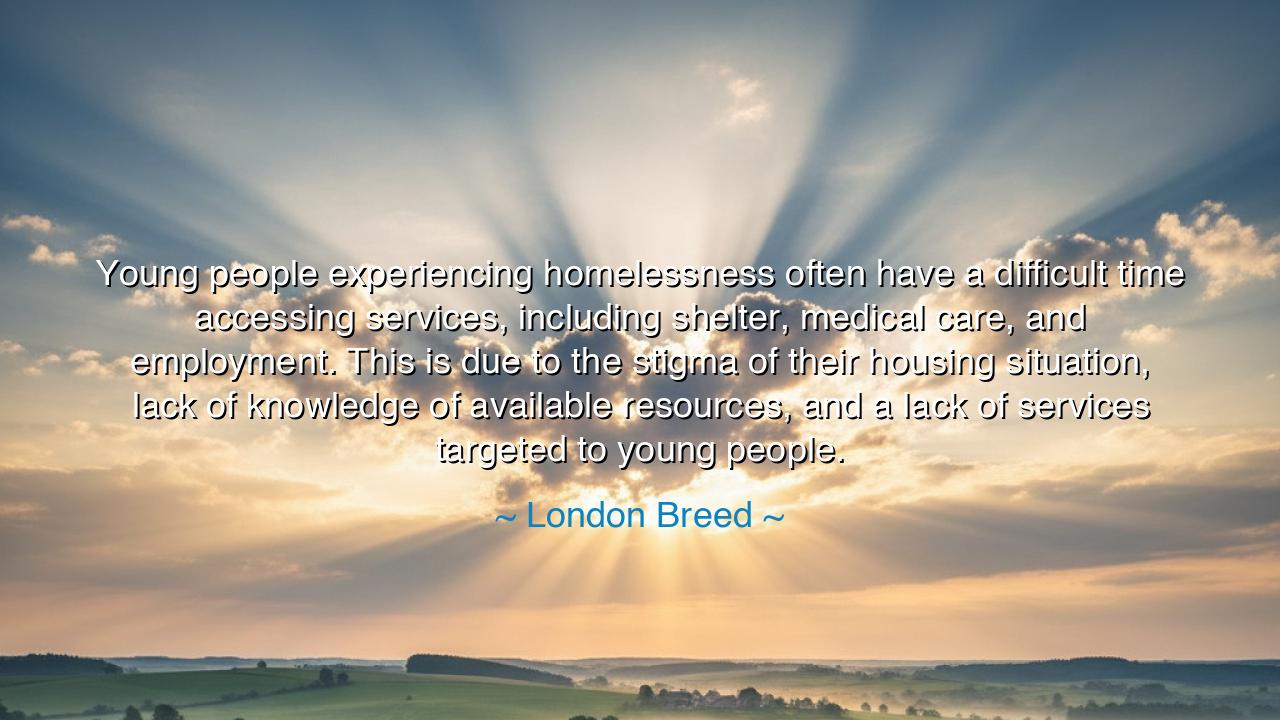
Young people experiencing homelessness often have a difficult
Young people experiencing homelessness often have a difficult time accessing services, including shelter, medical care, and employment. This is due to the stigma of their housing situation, lack of knowledge of available resources, and a lack of services targeted to young people.






“Young people experiencing homelessness often have a difficult time accessing services, including shelter, medical care, and employment. This is due to the stigma of their housing situation, lack of knowledge of available resources, and a lack of services targeted to young people.”
Thus spoke London Breed, a leader who rose from hardship to hope, whose heart still remembers the hunger of the streets and the loneliness of forgotten youth. Her words are not cold statistics; they are the echo of lived experience—the cry of those who walk invisible among us, the young souls adrift in a world that looks past them. In her voice resounds an ancient plea: see the unseen, lift the fallen, and remember that the measure of any society lies in how it treats its most vulnerable.
In this truth lies the wisdom of all ages. The young and homeless are not merely without shelter—they are often without belonging. The streets become both prison and teacher, and each day is a battle not just for food or warmth, but for dignity. Breed speaks of stigma, that cruel shadow that turns compassion to judgment. The world too often confuses circumstance with character, as if losing a home meant losing one’s worth. Yet the ancients would have seen it differently. Among them, hospitality was sacred, and to turn away the wanderer was to offend the gods themselves.
The roots of her insight reach into her own life. London Breed was once a child of public housing, raised amidst scarcity but never surrendered to despair. She knew firsthand how hard it is to climb when the rungs of opportunity are broken. And so, her words are not pity—they are resolve. She calls out not for sympathy, but for structure, for a society that builds bridges rather than walls. In her quote, she exposes a wound in our collective soul: that even when abundance exists, the young are lost for lack of guidance, their hands empty not of strength, but of direction.
In the annals of time, this struggle is not new. Consider the story of Victor Hugo’s Jean Valjean, who, as a young man, stole bread for his starving family and was condemned to a lifetime of shame. His story mirrors the truth that poverty punishes the desperate, and society often refuses to forgive. Likewise, homeless youth today are not criminals but survivors—caught between innocence and endurance, between a past that failed them and a future that remains out of reach. What they need is not condemnation, but compassion armed with wisdom.
Breed’s words call attention to the failures of the system: a lack of targeted aid, of understanding, of connection. When a young person seeks help and finds only bureaucracy, when they ask for refuge and are met with suspicion, they learn to disappear. And when they disappear, so too does a part of our collective humanity. For every lost youth is a seed of potential left untended, a song left unsung. The problem, Breed reminds us, is not only material—it is moral. It is the blindness of those who have roofs over their heads but not empathy in their hearts.
Yet, within her statement there also burns hope—for acknowledgment is the first step toward healing. By naming the barriers—stigma, ignorance, and neglect—she lights the path for action. She invites the listener to become a builder of bridges, to replace judgment with understanding, to create systems that see the young not as problems, but as possibilities. In this, her wisdom aligns with that of the ancients, who taught that “to lift one soul from despair is to save the world entire.”
And so, let this be the lesson we carry forward: Compassion must not remain a feeling—it must become a practice. Seek out those who are unseen. Support the shelters, the teachers, the mentors who restore what society has broken. Do not let the young be crushed by shame, nor lost to silence. Remember always that greatness is not found in the walls we build for ourselves, but in the doors we open for others.
For in the end, London Breed’s words are a reminder of our shared duty—to see, to serve, and to stand beside those who have been cast aside. When the youth of our streets are given not pity but purpose, not charity but opportunity, we heal not only their lives but our own humanity. Let this truth endure through the ages: a civilization that shelters its young shelters its future; a people that restores the lost restores itself.






AAdministratorAdministrator
Welcome, honored guests. Please leave a comment, we will respond soon